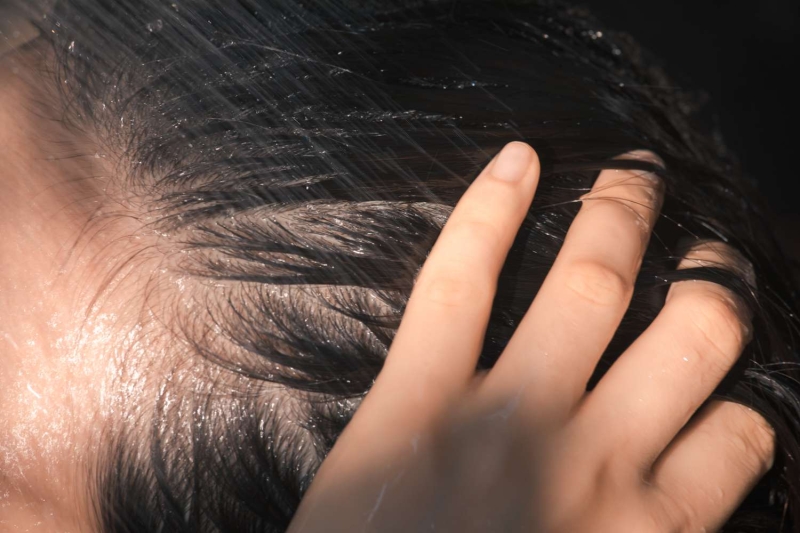Contents
When it comes to hair care, we often focus on the strands themselves, but there's a crucial element that is often overlooked—the scalp. Just like the soil in a garden, your scalp is the foundation from which healthy, vibrant hair grows. Neglecting scalp health can lead to a host of issues, from dandruff and itchiness to hair thinning and loss.
Meet the expert
- Shab Caspara is a hair growth expert and trichologist.
Andrea Hui Austin, MD, board-certified dermatologist and surgeon.
Kseniya Kobets, MD is a board-certified dermatologist and director of cosmetic dermatology at Montefiore Einstein Advanced Care.
Below, we dive deep into the world of scalp care, exploring the best practices and expert tips to keep your scalp in peak condition. Whether you struggle with dryness, oiliness, or sensitivity, understanding the needs of your scalp is the first step towards achieving luscious locks.
Determining Your Scalp Type
Your hair's health can be significantly affected by your scalp type. Factors such as moisture balance, hair strength, and issues like dandruff, breakage, or hair loss can all be influenced by your scalp type. To determine what scalp type you have, start by examining your scalp when it is clean and free from any hair products. If your roots are oily at the end of the day or they day after a wash, it's likely oily. A dry scalp will feel tight and itchy, and possibly flake. A combination scalp may feel both dry and in different spots. And a normal scalp feels good and lacks excessive oil, itchiness, or dryness.
According to board-certified dermatologist Kseniya Kobets, dry scalp can exhibit symptoms of both dryness and oiliness simultaneously. One possible cause of dry scalp is dandruff, also known as seborrheic dermatitis, which is believed to result from an overgrowth of the yeast fungus Malassezia spp on the scalp. Dry scalp can also be a consequence of psoriasis, characterized by the appearance of silvery, white patches or plaques. In some cases, eczema can contribute to dry scalp as well, especially when triggered by allergic contact dermatitis due to sensitivities towards fragrances, preservatives, or irritants present in scalp products such as shampoos and conditioners.
10 Steps to a Healthy Scalp
1. Regular Washing
How frequently you cleanse your hair depends on your scalp type and lifestyle.
Oily Scalp: According to trichologist Shab Caspara, oily scalps should be washed frequently and effectively to prevent build-up that can block hair follicle openings and ultimately lead to soreness and more complex scalp issues. She explains that oily scalps not only require stronger cleansing shampoos, but also supplementary products like scrubs and exfoliants to occasionally provide a deeper clean beyond what a regular shampoo can achieve.
Normal Scalp: Andrea Hui Austin, MD says “individuals with normal scalps should aim to wash their hair every two to three days or after exercising." Caspara adds that occasional deep cleansing is needed for this scalp types to eliminate product and environmental build-up, which can cause itching and irritation over time.
Combination Scalp: For combination scalps, it is recommended to wash every two to three days using clarifying shampoo and a moisturizing conditioner.
Flakey Scalp: "In some cases, a prescription shampoo, such as Ketoconazole 1% (Nizoral) shampoo, anti-fungal or tar-based medication, might be necessary. Ingredients like salicylic acid can assist in preventing dandruff accumulation and clarifying the scalp and hair,” she explains.
Dry Scalp: This scalp type should be washed every three to five days or less frequently. Our experts suggest using moisturizing formulas that promote scalp health and nourish dry hair.

2. Conditioning
According to our experts, conditioner is crucial for all hair types. When you have an oily scalp, Dr. Koberts says its imperative to focus the conditioner on your mids and ends and avoid your roots. for dry scalp and hair as it aids in replenishing moisture to preserve hair volume.
3. Exfoliate
So long as your scalp isn't sensitive, exfoliation can help remove product and dead skin build-up, allowing nutrients from your routine to better penetrate. However, its a necessary step for those experiencing dandruff, itchiness, and excessive oiliness. Caspra recommends double cleansing the scalp every time you wash and incorporating an exfoliant at least once a week for an additional cleansing boost and dislodging of flakes.
4. Scalp Treatments
For dry scalp, our experts recommend using treatments containing nourishing oils like Hask Tea Tree Scalp Relief Serum or Mielle Rosemary Mint Scalp & Hair Strengthening Oil. “Oil treatments can be used to help hair growth. I recommend doing this once a week or less and washing it out thoroughly,” says Dr. Koberts. “I also suggest using over-the-counter red LED light treatments three times a week to reduce inflammation—though it may take several months, these have been proven effective with certain devices. Additionally, I perform PRP (platelet-rich plasma) injections in my office, where we extract growth factors from the patient’s blood and re-inject them into the scalp to stimulate hair growth over time.”
5. Maintain a Balanced Diet
“Excessively fatty diets and poor circulation caused by diabetes, are common causes of imbalanced and oily scalp types prone to flaking,” says Caspera. “Supplements that greatly benefit the scalp include vitamin A for cell rejuvenation and collagen stimulation, omega-3 fatty acids for moisture and protection by decreasing inflammation and vitamin E for overall scalp health.”

6. Manage Stress
“Stress can result in an overall inflamed state of the body, scalp, and hair which can lead to scalp damage by disrupting the natural balance of oils, increasing inflammation, and potentially triggering hair loss,” says Dr. Austin. “Topical treatments such as Plated Skin Science Hair Serum can be applied nightly to calm stress-induced hair loss and promote healthy hair regrowth.”
7. Gentle Styling
This goes without saying, but over-styling can damage your scalp. Avoid tight hairstyles and minimize heat exposure to help reduce tension and prevent damage to the scalp and hair follicles.
8. Hygiene Practices
Washing your scalp after exercising and sweating helps remove excess sweat, bacteria and oil buildup that can clog hair follicles leading to irritation and dandruff.
9. Scalp Massage
Scalp massages are beneficial for improving blood flow to the scalp and delivering essential nutrients to the hair follicle.
10. Professional Consultation
Overall, it is best to consult with a hair expert such as a board-certified dermatologist, to determine the type of scalp and hair you have. A customized treatment plan, which may include prescription medications can ensure your best head of hair!
